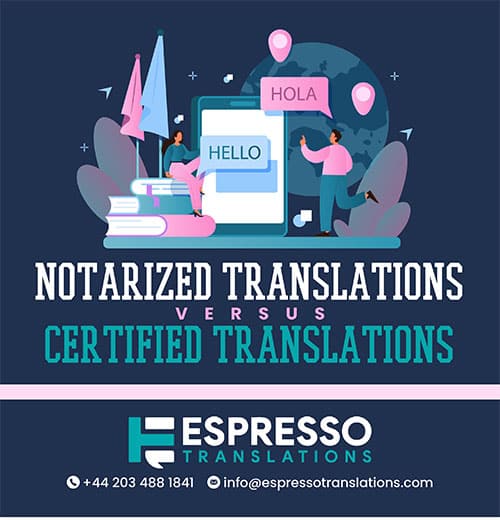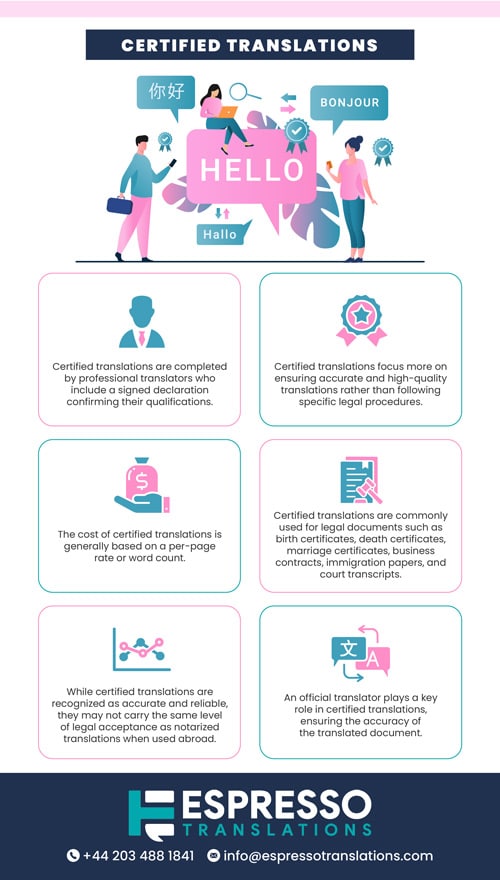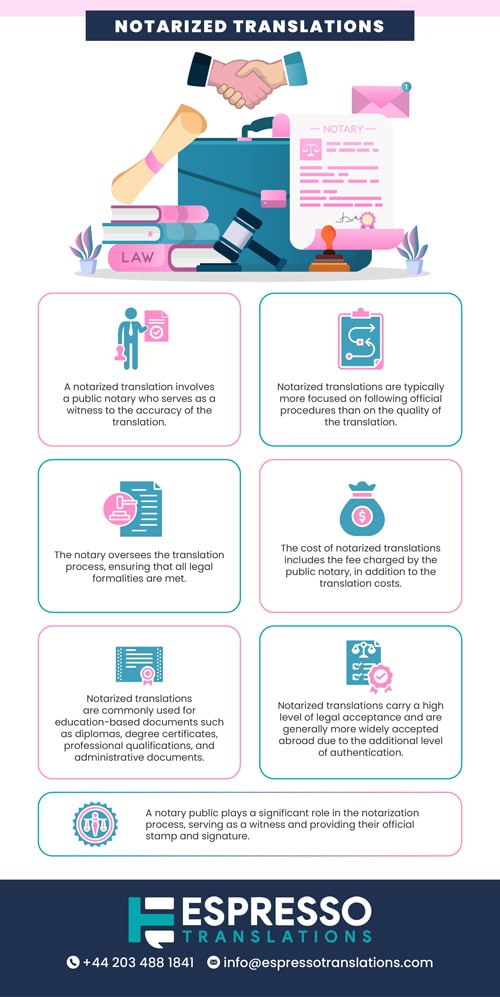When you need a document translated, it’s important to understand the differences between the two different types of translations. You should be able to distinguish between certified translation and notarized translation and know what sets them apart.
The difference between notarized and certified is especially good to know when you are submitting legal documents or documents for official purposes. Read on to understand the main distinctions between the two, as well as the differences and how to determine whether your translation should be certified or notarized (or both).
What is the difference between certified and notarized translations?
First, what is a certified translation? This is a translation performed by a professional translator who then signs a statement certifying that the translation is a true and accurate representation of the original document.
A notarized translation is a certified translation with an extra step added. First, the document is translated, and then the translator takes the translation and the unsigned certificate to a notary public who checks the translator’s identification and verifies their identity. The notary public then authenticates the signature on the translation certification.
What are the requirements for notarized translations and certified translations?
The requirements for certified vs notarized translations are listed in the table below:
| Requirement | Certified Translation | Notarized Translation |
|---|---|---|
| The translator needs to be proficient in both the original and target languages. | Yes | Yes |
| The translator must have a good understanding of the translation’s topic. | Yes | Yes |
| The source document should be translated fully and accurately. | Yes | Yes |
| The translated document comes with a “Certificate of Accuracy” statement that attests to the translator’s proficiency and the veracity of the translation. | Yes | Yes |
| The individual certifying the translation must sign the certificate of accuracy while the signature is witnessed in person by a notary public. | No | Yes |
| A public notary verifies the identity of the person signing, witnesses their signature on the certificate, and then notarizes the certificate with their signature and seal. | No | Yes |
What is the role of a notary public and a certified translator?
The two roles are quite different. The certified translator must produce high quality, accurate and reliable translations that meet professional translation standards. The translator attaches a statement of truth or affidavit to their translation to give it legal validity.
The notary public, on the other hand, plays no part in the translation itself. The notary simply handles the legal formalities in the signing of the certificate and affixes their official stamp as a witness to the validity of the signature on the certificate. The notary’s role is solely to provide official verification of the procedures. They do not check the accuracy or quality of the translation.
What is the cost of certified document translation vs notarized translations?
As with most translations, the cost of a certified translation is calculated by the total words or number of pages in the document, or sometimes by the hour needed to do the translation. The certification process usually incurs an additional fee because of the extra quality control involved and the translator’s personal responsibility taken when certifying that the translation is accurate. That said, the total involved can vary from translator to translator, or agency to agency.
Adding a notarization to the translation services means adding the fee paid to the notary public or translator. The fee is usually based on the number of pages to be notarized, and this fee also varies from notary to notary. In short, a notarized vs certified translation is a matter of an extra bit of assurance and a small extra fee.
You can rely on Espresso Translations for transparent and reasonable pricing on certified or certified and notarized translations. And a quote from us is always fast and free!
What is the difference in legal acceptance between notarized and certified translation services?
Here is a summary of the differences in the legal acceptance of a certified translation as opposed to a notarized and certified translation.
Certified translations
- Certified translations are generally accepted in official and legal proceedings such as immigration and court submissions in countries like the United States or the United Kingdom.
- Universities or other academic institutions often require certified translations for diplomas and other educational documents submitted.
- Governments often asks for certified translations of official papers when you are applying for a visa or undergoing naturalization and immigration procedures.
Notarized translations
- Notarization of a translated document is generally required for more formal legal documents, especially for legal translations that are going to be used in foreign countries.
- Some jurisdictions or institutions require a notarization on a translated document in order to provide additional authenticity.
- Notarization is often needed for documents like deeds of property, power of attorney papers, and adoption papers.
When to use a certified translation and a notarized translation?
If you are submitting documents to the United States Citizenship and Immigration Services (USCIS) related to migration, you will need to get a certified translation. Likewise, the US Department of State requires certified translations of all foreign-language documents submitted to it.
The extra step of notarizing a certified translation is frequently required for education-related documents like diplomas, college degrees, and other administrative documents.
If you are unsure what you need, the first measure to take is to ask the recipient of the translation what they need. Don’t forget that the helpful project managers at Espresso Translations can offer you advice based on their professional experience.

What is a certified translation?
A certified translation is a professional translation accompanied by a statement declaring that it is a true and accurate translation of the original document. This statement also includes the translator’s name, signature, address and other contact information, and the date of the translation.
What is the purpose of a certified translation?
You should ask a translator to certify a translation as a measure that identifies the translator and assigns responsibility to them for possible inaccuracies or omissions. For documents translated for official or legal purposes, a wrong translation can have costly or time-consuming implications, so getting a certified translation is particularly important. A certified translation means that the translator is taking personal responsibility for the accuracy of their translation.
When to use certified translations?
When you request a translation of any of the following documents, you should find a certified translator with a professional translation agency:
- Birth certificates
- Death certificates
- Marriage certificates
- Business contracts
- Immigration papers
- Court transcripts
Who can provide certified translations?
In the United States, unlike in many other countries, there are no formal credentials required of those producing certified translations, who may be referred to as sworn translators. The United Kingdom also does not have this requirement.
Some institutions in the US, however, may have their own requirements to ensure they receive a high-quality translation. They may ask that translated documents submitted to them be done by a translator or translation company that is accredited by a professional body in the translation industry such as a certificate from the American Translators Association or passage of the UN’s Language Proficiency Exam (LPE). Other institutions may also require notarized translation of any documents submitted.

What is a notarized translation in the US?
In the United States, a notarized translation involves a verification of the identity and signature of the translator who completed the translation. This is done by using the services of a notary public. Notarized translations are often required when submitting administrative documents, legal agreements, or certificates to US courts of law, educational institutions, or employers, or when submitting documents to foreign public entities.
The procedure for a notarized translation is for a professional translator to translate the document from one language to another. The translator affixes a translation certification to the translation, taking full responsibility for the quality of the translation. Then the translator brings the documents to a notary public, who checks the translator’s identification and verifies their identity, witnessing the translator’s signature on the certificate of translation.
Thus, a notarized translation is a translation that affords another degree of credibility by verifying the translator’s identity. Please note, however, that the notary does not determine the accuracy of the translation (this is done by the certifying translator). A notarized translation simply proves that the notary has checked the translator’s identification and witnessed their signature.
Also Read: What is the difference between certified and sworn translations?
How do I get a translation notarized?
First of all, ask the party that will receive the translation what their specific requirements are. You should also ask whether the notarization should be done in the source language country or the target language country. While you are asking this, check whether the original document needs to be apostilled before the translation is notarized.
Next, contact a translation agency with proven experience in this field, such as Espresso Translations. You will need to provide a completely legible scan of your document, ideally with a digital (typed) version of any handwritten parts.
Before sending in the document to be translated, find out what the agency’s privacy policy is, so that you know how the agency will handle your personal data. Then let the agency proceed with your translation project. Espresso Translations takes particular care to properly translate the documents you need, including privacy protections, and will make sure that your original document is translated accurately and promptly.
When to use notarized translation?
Hire a certified translation agency like Espresso Translations to get notarized translations of legal or official documents that require certification by a notary. If you need to submit any education-based documents like diplomas, degree certificates, professional qualifications, and other administrative documents that are not in English, particularly overseas, you likely will need a notarized translation.
Notarized translations are often more accepted abroad because of the state certification of the notary public. You should always check with the institution requesting the translation to find out what kind of certification they will accept.

What does local notary public mean?
A local notary public is a person who passed an exam and applied to their state of residence to become qualified as an impartial witness who can verify the identity of persons appearing before them. For a translation, this means determining the identity of the translator providing a certified translation. Notaries carry out legal formalities like the signing of certificates and they provide stamps and follow official procedures.
Notaries do not act as translators and generally cannot themselves check that your document is translated correctly — that is the job of the translator.
Different requirements in different countries
In the United States, there are no official credentials for translators, although you might see qualifications issued by the American Translators Association or the United Nations LPE (language proficiency exam) program. Many other countries, however, have a government body that can issue credentials to translators in certain languages.
Because each country has different requirements, it is important to ascertain what the specific requirements are for a particular country before getting a document translated, such as whether the translation certificate should be certified by a notary. If you’re still not sure what type of translation you need, ask a project manager at Espresso Translation, and they will be happy to help whether you need notarized translations, sworn translations, or another type of official translation. Get a quote today.

